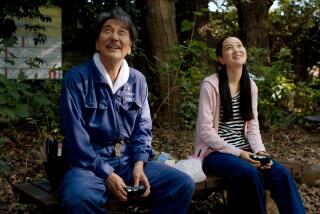Japanese master known for his erotic ‘Senses’
- Share via
Nagisa Oshima, a founding father of the Japanese New Wave, is known by most for a single succes de scandale: “In the Realm of the Senses,” his foray into hard-core erotica that was released in the U.S. in 1977. An Eastern counterpart to “Last Tango in Paris,” the film was a landmark in its day and it retains its power to provoke. But it is hardly representative of Oshima’s body of work. Of course, no single movie could be with this iconoclastic filmmaker.
A law student and a leftist activist before he turned to movies, Oshima hit his stride in the ‘60s; his decade-long run rivaled Jean-Luc Godard’s in its furious productivity, its knack for taking the political temperature of the times, its scorched-earth commitment to reinventing the form each time out.
Although he darted among filmmaking styles and genres (teen-rebel flicks, black comedies, family dramas), there was, throughout his career, a penchant for transgression -- specifically sex and crime -- and a sympathy for outsiders and the underclass, namely crooks and sociopaths, the downtrodden Korean minority in Japan and women within patriarchal structures.
He opted out of the studio system in the ‘60s and spent his most productive years as a freelancer until the near collapse of the Japanese film industry in the early ‘70s made securing funding impossible.
It was at this point that Oshima became reliant on international co-productions, teaming up first with the producer Anatole Dauman, who had worked with many French New Wave directors. Their two collaborations, “In the Realm of the Senses” and the 1979 U.S. release “Empire of Passion,” were both period pieces about sex and adultery, and they did wonders for Oshima’s global profile.
“Senses” was an instant sensation -- the film had to be processed and edited in France to thwart Japanese censors -- and Oshima won a best director prize at the Cannes Film Festival for “Empire of Passion.” Both are being issued this week on DVD in new high-definition transfers by the Criterion Collection, “Senses” in both standard and Blu-ray editions.
Many of Oshima’s contemporary films were ripped from the headlines, so it’s no surprise that for “Senses” he was drawn to the most notorious sex crime in Japanese history -- the 1936 case of a maid who embarks on an intense affair with her employer, whom she eventually kills as they attempt to scale greater heights of erotic abandon. The squeamish detail that has rendered the story immortal: She cut off his phallus for a keepsake.
There exists a long tradition of explicit films in Japan (soft-core “pinku eiga,” or pink films) but nothing remotely like “In the Realm of the Senses,” which locks its lovers in a hothouse of sexual obsession and never looks away. As Oshima said in court when defending himself against obscenity charges, “Nothing that is expressed is obscene. What is obscene is what is hidden.”
The performances by Eiko Matsuda and Tatsuya Fuji are, it goes without saying, fearless. And as always with Oshima, even in this claustrophobic context, there is a political and social dimension. As the codes and mores of the outside world fade away, and the affair becomes increasingly sadomasochistic, the roles of the lovers begin to reverse.
In “Empire of Passion,” a peasant woman (Kazuko Yoshiyuki) and her younger lover (Fuji) kill her husband, a rickshaw driver, and the guilt-stricken murderers are haunted by their victim’s ghost. Though the film shares a few surface similarities with “Senses” -- it’s also based on an actual event, this time from the 1890s -- this restrained supernatural folk tale is more concerned with the aftermath than the throes of amour fou.
These discs, welcome as they are, scratch the surface of Oshima’s varied output. Most of his films remain unavailable on home video and had until recently been in danger of slipping into obscurity.
Within the last year, though, a new generation of cinephiles has been able to discover his work: A major retrospective organized by the Cinematheque Ontario has been touring North America since last fall and arrives at the Los Angeles County Museum of Art and the American Cinematheque next month.
--
More to Read
Only good movies
Get the Indie Focus newsletter, Mark Olsen's weekly guide to the world of cinema.
You may occasionally receive promotional content from the Los Angeles Times.










